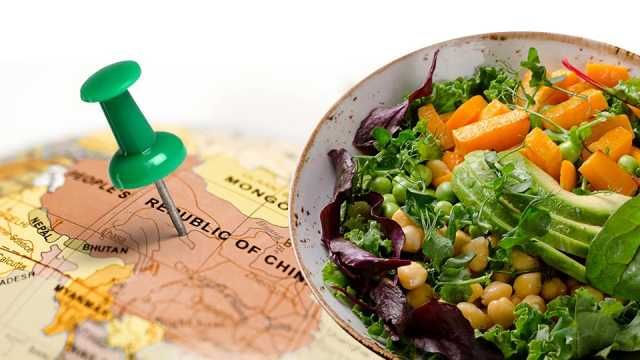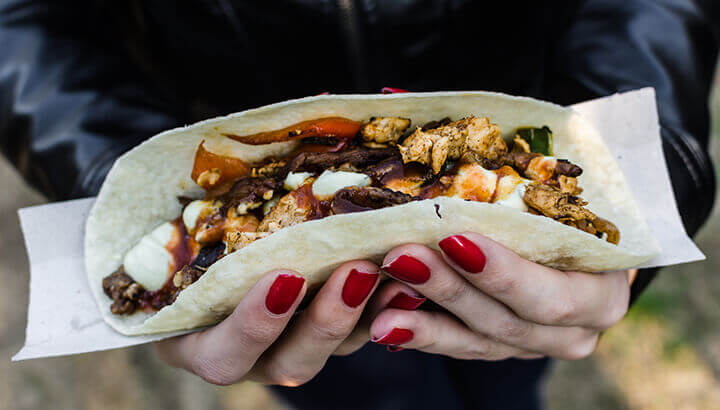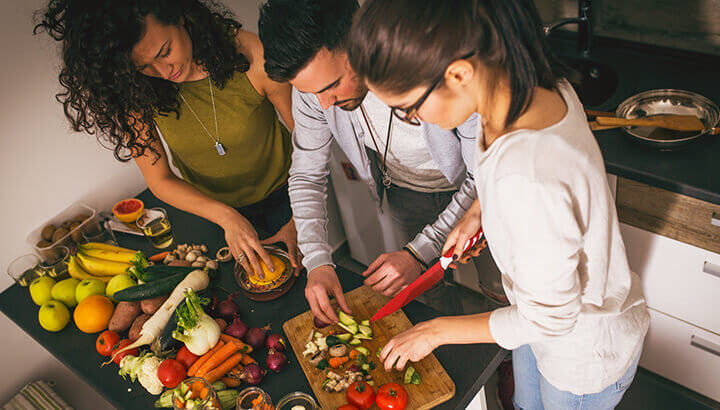
It doesn’t have to be difficult to eat ethically abroad. Obviously, being a vegan or vegetarian can make travel a little more complicated, but it really isn’t as bad as it sounds. The trick is to be prepared, know what to expect and have a plan up your sleeve for dealing with the challenges of the road. After all, nobody should be held back from the opportunity to travel, and with these simple tips, you’ll certainly never starve.
1. Pick your destination carefully
Your destination will probably be the biggest determining factor for how hard it is to find a decent meal. While countries like India and China are extremely easy on the vegetarian and even vegan diet, you’ll have a much harder time somewhere like Argentina. Obviously, you should never refuse to visit a country simply because of a lack of vegetarian or vegan options, but it’s still worth putting some thought into your destination ahead of time.
2. Forget asking for the vegetarian/vegan option
Once in Venezuela, I asked for a vegetarian empanada. The confused response I got was something like, “Well, we have a chicken empanada, and pork, and sausage, and beans with sausage, and beef with pork, and…”
Eventually, the empanada vendor mentioned a bean filling, but only after listing every other option on the menu. The lesson here is don’t ask for the vegetarian or vegan option. Instead, just directly ask for what you actually want. This will save a lot of confusion, because…
3. Much of the world has no idea what a vegetarian is
Sorry, but outside of Asia and the western world, vegetarians are often unheard of, and vegans might as well come from a different planet. Latin America is a perfect example of a region where it’s usually not even worth mentioning you’re a vegetarian or vegan. Nobody knows what it is, and nobody will understand your convoluted explanation. This is why it’s so important to just cut to the chase, and just order exactly what you want. You may also want to receive a complete list of your meal’s ingredients, because…
4. You will be served meat

Let’s get this depressing reality out of the way: at some point on your trip, the worst is going to happen and you’re going to have to handle it in a diplomatic manner. Take the aforementioned empanada vendor. He was selling cheese empanadas, which may seem like a great choice for a vegetarian. However, Venezuela has a deep love affair with spam, which somehow seems to find its way into everything. Needless to say, the cheese empanada was impregnated with small chunks of spam.
This kind of problem is extremely normal. I’ve lost count of the number of times I’ve ordered a vegetable soup only to find lumps of submerged beef, a vegetarian plain egg omelet loaded with spam, plain rice with some sneaky chicken, and a vegan salad with creamy dressing. If you can stomach eating around the offending ingredients, you’ll save yourself a lot of hassle. If you can’t, then ensure you resolve the problem in a calm, polite manner. Odds are you’re dealing with someone who has no idea why you don’t want to eat pink slime, so be gentle. Your only other alternative is to…
5. Cook for yourself
The obvious, easiest way to sidestep the stress of traveling with any particular dietary need is to simply cook for yourself when possible. When booking a hostel, your first question should be whether it includes a kitchen for use. Along with saving you money, it’ll give you complete control of what goes on your plate. Plus, you get a chance to toy with local produce, which can be an adventure of its own.
6. Check out local vegetarian and vegan communities
At this point, you’re probably feeling a bit glum about your chances of surviving as an ethical eating traveler, but don’t be. Now that we’ve got the worst out of the way, we can discuss some of the unexpected positives of vegan/vegetarian travel. Despite the point made in #4, you’ll be surprised to find vegans and vegetarians in some pretty unexpected places. Fellow vegans or vegetarians can be delighted to have visitors who share similar values and passions; this is especially true in countries where ethical eating communities are small. You can share a few recipes and even make friends for life.
Social media can be a good place to start, and Reddit’s vegetarian and vegan communities are likewise decent sources of advice. Pinterest and Instagram can also be useful for finding local dishes that adhere to your diet. Just search for #vegantravel, and you might be impressed by what you’ll find at your destination.
7. Couchsurfing

One great thing about Couchsurfing is that you can specifically look for hosts who share your diet. It’s not always possible, but finding a place to stay with a fellow vegan or vegetarian can make a huge difference to your trip. You’ll immediately have someone to connect with, who can potentially give you a leg up in terms of understanding how to survive as a vegan or vegetarian in the local area.
8. Make Happy Cow your new best friend
Often dubbed the vegan Yelp, Happy Cow is one of the best resources out there for tracking down vegan restaurants. They don’t always have much reliable information for obscure destinations, but for the average traveler, Happy Cow can be a godsend. Obviously, vegetarians will likewise find this resource useful.
9. Plan ahead
Even if you’re in contact with the local vegetarian or vegan community, have done your research on Happy Cow and booked a hostel with a kitchen, it’s still worth being prepared for the worst. Always keep a few easy snacks in your back pocket, such as granola bars or some other go-to food that adheres to your diet. Keep a small stockpile of safe snacks in the bottom of your backpack, and don’t be afraid to crack them open in case of emergency.
10. Pack toiletries
This is especially important for vegans, as you never know when some kind of sneaky animal product might find its way into your shampoo. Stock up on everything from soap to deodorant before you leave home. Try to make things as multi-use as possible. For example, Dr. Bronner’s has a great liquid that can be used as toothpaste, shampoo, body soap and even as a detergent. Works pretty well, too.
11. Try to relax
The single most important tip of all is to take it easy. It’s inarguable that traveling as a vegan or vegetarian can be stressful at times, but don’t give up. Even when #4 inevitably happens (which it totally will), the trick is to stay cool and roll with the punches. Maintain a good sense of humor, and find ways to handle what you’re given without compromising your values. Things will go wrong and there will be tough moments, but never let them overwhelm you.
— Ryan Mallett-Outtrim

